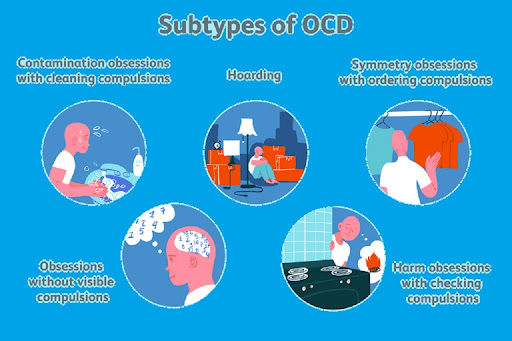OCD

OCD (Obsessive-compulsive disorder)
The obsessive-compulsive disorder usually includes both obsessions and compulsions.
Obsessions are repeated, persistent and unwanted thoughts urge, or images that are intrusive and cause distress or anxiety. Compulsions are repetitive behaviors that you feel driven to perform.
OCD obsessions are repeated, persistent and unwanted thoughts urges, or images that are intrusive and cause distress or anxiety.
Obsessions often have themes to them, such as:
- Fear of contamination or dirt
- Doubting and having difficulty tolerating uncertainty
- Needing things orderly and symmetrical
- Aggressive or horrific thoughts about losing control and harming yourself or others
- Unwanted thoughts, including aggression, or sexual or religious subjects
Examples of obsession signs and symptoms include:
- Fear of being contaminated by touching objects others have touched
- Doubts that you've locked the door or turned off the stove
- Intense stress when objects aren't orderly or facing a certain way
- Images of driving your car into a crowd of people
- Thoughts about shouting obscenities or acting inappropriately in public
- Unpleasant sexual images
- Avoidance of situations that can trigger obsessions, such as shaking hands
Compulsion symptoms
- OCD compulsions are repetitive behaviors that you feel driven to perform. These repetitive behaviors or mental acts are meant to reduce anxiety related to your obsessions or prevent something bad from happening.
- Engaging in the compulsions brings no pleasure and may offer only temporary relief from anxiety.
As with obsessions, compulsions typically have themes, such as:
- Washing and cleaning
- Checking
- Counting
- Orderliness
- Following a strict routine
- Demanding reassurance
Examples of compulsion signs and symptoms include:
- Hand-washing until your skin becomes raw
- Checking doors repeatedly to make sure they're locked
- Checking the stove repeatedly to make sure it's off
- Counting in certain patterns
- Silently repeating a prayer, word or phrase
- Arranging your canned goods to face the same way
Severity varies
- OCD usually begins in the teen or young adult years, but it can start in childhood.
- Symptoms usually begin gradually and tend to vary in severity throughout life.
- The types of obsessions and compulsions you experience can also change over time.
- Symptoms generally worsen when you experience greater stress.
- OCD, usually considered a lifelong disorder, can have mild to moderate symptoms or be so severe and time-consuming that it becomes disabling.
Complications
Problems resulting from the obsessive-compulsive disorder may include, among others:
- Excessive time spent engaging in ritualistic behaviors
- Health issues, such as contact dermatitis from frequent hand-washing
- Difficulty attending work, school, or social activities
- Troubled relationships
- Overall poor quality of life
- Suicidal thoughts and behavior
